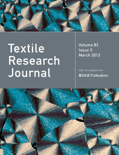
TEXTILE RESEARCH JOURNAL
Scope & Guideline
Unveiling Breakthroughs in Polymer Technology
Introduction
Aims and Scopes
- Innovative Textile Technologies:
Research on new materials and technologies in the textile industry, including advancements in 3D printing, smart fabrics, and sustainable textile production methods. - Cultural and Social Aspects of Fashion:
Exploration of how fashion interacts with identity, culture, and society, including studies on gender, race, and consumer behavior. - Sustainability and Ethical Practices:
Focus on sustainable practices in textile production and consumption, including upcycling, sustainable design, and corporate social responsibility within the fashion industry. - Consumer Behavior and Market Trends:
Analysis of consumer attitudes, behaviors, and trends in the fashion market, employing psychological and sociological frameworks. - Educational Approaches in Textile Studies:
Investigating pedagogy and learning experiences in textile and apparel education, emphasizing innovative teaching methods and curriculum development.
Trending and Emerging
- Digital Fashion and Virtual Experiences:
An increasing focus on digital fashion, including virtual exhibitions and the use of augmented reality in consumer engagement, reflecting the industry's adaptation to technological advancements. - Adaptive and Inclusive Apparel:
Growing attention to adaptive fashion and inclusivity in design, particularly regarding the needs of individuals with disabilities, showcasing a commitment to social responsibility. - Machine Learning and Data Analytics in Fashion:
The application of machine learning for trend forecasting, consumer behavior analysis, and design optimization is becoming a prominent theme, indicating a shift towards data-driven approaches in the industry. - Sustainable Fashion Innovations:
A surge in research addressing sustainable practices, including upcycling and the use of eco-friendly materials, aligns with global calls for sustainability in the fashion industry. - Intersectionality in Fashion Studies:
Exploration of how multiple identities intersect within fashion contexts, including race, gender, and class, highlighting the complexity of consumer experiences and cultural representations.
Declining or Waning
- Traditional Textile Techniques:
There has been a noticeable decline in research focused on traditional textile techniques and crafts, as more emphasis shifts towards innovative and technology-driven methodologies. - Gender-Specific Apparel Studies:
While gender studies remain important, there has been a reduction in research explicitly limited to gender-specific apparel, as discussions increasingly encompass broader identity and intersectionality issues. - Historical Fashion Analysis:
Research focusing solely on historical fashion trends and their implications is becoming less frequent, as contemporary issues and technological advancements take precedence. - Basic Textile Science:
Studies centered around fundamental textile science principles are declining, likely overshadowed by more applied research in technology and sustainability.
Similar Journals
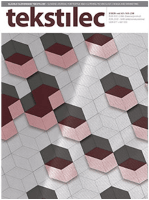
Tekstilec
Fostering innovation at the intersection of textiles and technology.Tekstilec, an esteemed journal published by University of Ljubljana, Slovenia, has been a prominent platform in the fields of textiles, engineering, and industrial management since its establishment in 1989. With an Open Access model since 2000, the journal ensures that scholarly research is accessible to a global audience, fostering the dissemination of knowledge across various disciplines. While its impact factor remains unlisted, Tekstilec holds respectable rankings within its categorized quartiles, featuring a 2023 Q4 ranking in Business and International Management and Q3 rankings in multiple engineering and material science categories. This positions the journal as a vital resource for researchers, professionals, and students seeking insights into textiles and their multidisciplinary applications. With a commitment to advancing knowledge in its scope, Tekstilec invites contributions that explore innovative research and practical developments, encouraging collaboration within the global academic community.
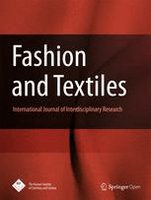
Fashion and Textiles
Transforming Trends into Academic InsightFashion and Textiles is a distinguished open-access journal published by Springer, focusing on the interdisciplinary realms surrounding fashion, textile innovation, and their socio-cultural implications. Since its inception in 2014, this journal has aimed to foster a deeper understanding of the rapidly evolving landscape of fashion and textiles through rigorous research and scholarly discourse. With an impressive Q1 ranking in Cultural Studies and prominent positions in several other categories, including Marketing and Social Psychology, the journal holds a significant place in its field. The journal, based in Singapore and accessible globally, provides authors and readers with a platform for high-quality research exchanges that influence both academia and industry practices. Open access since its launch, it has proven to be an essential resource for researchers, practitioners, and students who seek to contribute to and engage with the latest trends and developments in fashion and textiles.
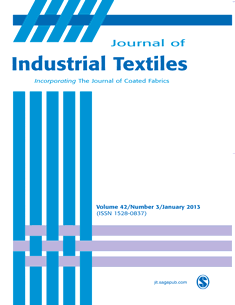
Journal of Industrial Textiles
Advancing Knowledge in Textile EngineeringJournal of Industrial Textiles, published by SAGE Publications Inc, is a leading academic journal that focuses on the intricate interplay between textile materials and industrial applications. With a significant impact factor and a strong reputation in the field, it caters to a diverse audience ranging from researchers and professionals to students interested in the advancement of textile engineering, chemical engineering, and materials science. The journal offers invaluable insights into innovative textile processes, sustainable practices, and the latest technological developments as it spans research contributions from 1971 to the present. Notably, it ranks in the second quartile across various categories, including Chemical Engineering and Industrial and Manufacturing Engineering, reflecting its influence and quality in the scientific community. Although it is not an open access journal, the Journal of Industrial Textiles remains a critical resource for advancing knowledge and fostering collaboration within the textile sector and related fields.

Journal of Consumer Sciences
Innovating insights for a changing consumer landscape.Journal of Consumer Sciences is a pivotal publication in the field of consumer science, dedicated to advancing knowledge and understanding within this dynamic and interdisciplinary area. Published by the SOUTH AFRICAN ASSOCIATION FOR FAMILY ECOLOGY & CONSUMER SCIENCES (SAAFECS), this journal serves as a platform for researchers, professionals, and students seeking to explore contemporary issues and innovations affecting consumer behavior, family ecology, and sustainable consumption practices. Although specific metrics such as the impact factor and H-index are currently unavailable, the journal's commitment to open access and the dissemination of high-quality research positions it as a key resource for scholars seeking to make meaningful contributions in this rapidly evolving discipline. Based in Stellenbosch, South Africa, the journal encompasses a broad range of topics and aims to bridge theoretical frameworks with practical applications, making it an essential read for anyone engaged in consumer sciences.
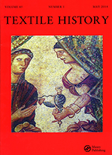
TEXTILE HISTORY
Illuminating the Cultural Tapestry of TextilesTEXTILE HISTORY is a distinguished journal focusing on the rich tapestry of textile development across various historical contexts, published by Routledge Journals, Taylor & Francis Ltd. With origins dating back to 1968, this journal serves as a crucial platform for scholarly discourse in the fields of history, industrial and manufacturing engineering, and business management. It holds impressive rankings, including Q2 in History and ranks within the top 20% in Arts and Humanities, reflecting its significant contribution to understanding the socio-economic and cultural implications of textiles. Additionally, it operates under a traditional access model, ensuring that quality research is preserved within a structured environment. The journal is an invaluable resource for researchers, professionals, and students alike, aiming to advance knowledge and inspire future studies in textile history. Situated in the United Kingdom, the editorial team is committed to fostering a vibrant academic community that engages with the dynamic intersections of textiles, industry, and cultural heritage.

EGYPTIAN JOURNAL OF CHEMISTRY
Shaping the Future of Chemistry through Rigorous ResearchThe Egyptian Journal of Chemistry, published by the National Information & Documentation Centre (NIDOC), serves as a vital platform for disseminating novel research and advancements in the field of chemistry and its interdisciplinary applications. Established in 2004 and continuing its publication through 2024, this journal encapsulates a diverse range of topics including Biochemistry, Chemical Engineering, and Materials Science, reflected in its respectable Scopus rankings. With an array of Quartile rankings indicating its varying impact across different categories, scholars can benefit from its insights into innovative solutions and methodologies that address pressing scientific challenges. Although it currently does not operate under an open access model, researchers and students are encouraged to leverage its findings as it plays a pivotal role in the academic landscape of Egypt and beyond. For those engaged in chemical research, the Egyptian Journal of Chemistry stands as an essential resource, contributing significantly to the global body of scientific knowledge.
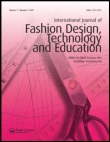
International Journal of Fashion Design Technology and Education
Transforming the Fashion Landscape Through Scholarly ExplorationThe International Journal of Fashion Design Technology and Education, published by Taylor & Francis Ltd, stands at the forefront of research in the dynamic fields of fashion design, technology, and education. Since its inception in 2008, the journal has provided a vital platform for researchers, educators, and practitioners to share innovative findings, pedagogical strategies, and technological advancements within the fashion industry. With an impressive impact factor and categorizations in the Q1 and Q2 quartiles across multiple disciplines—including Visual Arts, Education, and Industrial Engineering—this journal not only offers insightful contributions to academia but also informs practical applications in the ever-evolving fashion landscape. Although currently non-open access, the journal remains accessible to a wide range of audiences, facilitating a deeper engagement with contemporary issues in fashion technology and education. As the journal converges its themes through to 2024, it continues to encourage submissions that push the boundaries of knowledge and creativity, making it an essential resource for anyone invested in the future of fashion.

FIBRE CHEMISTRY
Connecting Researchers to the Latest in Fibre Science and Engineering.Fibre Chemistry is an esteemed journal published by Springer, focusing on the intricate and evolving field of polymer science and textile engineering. With its ISSN 0015-0541 and E-ISSN 1573-8493, this journal serves as a pivotal resource for researchers, practitioners, and students, highlighting significant advancements and innovations in fibre technology since its inception in 1969. Despite its current positioning in the Q3 quartile across Chemical Engineering, Chemistry, and Materials Science categories, Fibre Chemistry continually aims to bridge the gap between fundamental science and practical application by disseminating high-quality, peer-reviewed research articles. The journal does not currently operate under an open access model, but it provides crucial insights that foster collaboration and drive progress within its field. With the ongoing convergence of technologies and materials, this publication is poised to contribute significantly to the academic discourse surrounding fibre chemistry and its related disciplines until 2024 and beyond.

Tekstil ve Konfeksiyon
Fostering Interdisciplinary Insights in Textile and FashionTekstil ve Konfeksiyon, a distinguished journal published by the E.U. Printing and Publishing House, serves as a vital resource in the fields of Industrial and Manufacturing Engineering as well as Materials Science. With an ISSN of 1300-3356, this Turkish journal has witnessed significant development since its inception in 2008, continuing to contribute valuable insights and advancements through 2024. Although categorized in the third quartile (Q3) for Industrial and Manufacturing Engineering and the fourth quartile (Q4) for Materials Science, the journal ranks respectably within its fields—249th out of 384 and 357th out of 463, respectively, according to Scopus. Researchers, professionals, and students can gain access to a variety of cutting-edge studies and applications that reflect the latest trends and innovations in textile and apparel technology. The journal emphasizes the importance of practical applications and interdisciplinary research, fostering a platform for knowledge exchange and development aimed at pushing the boundaries of textile and clothing sciences.
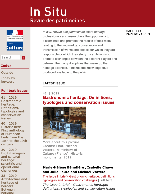
In Situ-Revue de Patrimoines
Advancing heritage studies for a sustainable future.In Situ-Revue de Patrimoines is a distinguished open-access journal published by the MINISTERE CULTURE & COMMUNICATION, dedicated to advancing the field of heritage studies. Established in 2001, this journal seeks to foster a deeper understanding of cultural heritage through the dissemination of high-quality research articles, reviews, and case studies that reflect the interdisciplinary nature of the discipline. With an ISSN of 1630-7305, In Situ provides scholars, practitioners, and students with invaluable insights into the preservation, management, and interpretation of cultural assets. By offering open access to its content, the journal ensures that vital knowledge in heritage conservation reaches a broad audience, promoting dialogue and collaboration within the global academic community. Situated in the heart of Paris, In Situ serves as an essential resource for those committed to the stewardship of our shared cultural legacy.